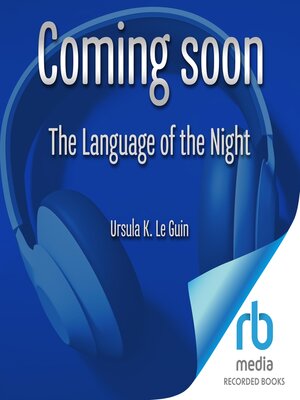The Language of the Night
audiobook (Unabridged) ∣ Essays on Fantasy and Science Fiction
By Ursula K. Le Guin

Sign up to save your library
With an OverDrive account, you can save your favorite libraries for at-a-glance information about availability. Find out more about OverDrive accounts.
Find this title in Libby, the library reading app by OverDrive.



Search for a digital library with this title
Title found at these libraries:
| Library Name | Distance |
|---|---|
| Loading... |
Featuring a new introduction by Ken Liu, this revised edition of Ursula K. Le Guin's first full-length collection of essays covers her background as a writer and educator, her thoughts on writing, and her commentary on literary science fiction and fantasy and their future.
"We like to think we live in daylight, but half the world is always dark; and fantasy, like poetry, speaks the language of the night."—URSULA K. Le GUIN
Le Guin's sharp and witty voice is on full display in this collection of twenty-four essays, revised by the author a decade after its initial publication in 1979. The collection covers a wide range of topics and Le Guin's origins as a writer, her advocacy for science fiction and fantasy as mediums for true literary exploration, the writing of her own major works such as A Wizard of Earthsea and The Left Hand of Darkness, and her role as a public intellectual and educator. The book and each thematic section are brilliantly introduced and contextualized by Susan Wood, a professor at the University of British Columbia and a literary editor and feminist activist during the 1960s and '70s.
A fascinating, intimate look into the exceptional mind of Le Guin, whose insights remain as relevant and resonant today as when they were first published.
"We like to think we live in daylight, but half the world is always dark; and fantasy, like poetry, speaks the language of the night."—URSULA K. Le GUIN
Le Guin's sharp and witty voice is on full display in this collection of twenty-four essays, revised by the author a decade after its initial publication in 1979. The collection covers a wide range of topics and Le Guin's origins as a writer, her advocacy for science fiction and fantasy as mediums for true literary exploration, the writing of her own major works such as A Wizard of Earthsea and The Left Hand of Darkness, and her role as a public intellectual and educator. The book and each thematic section are brilliantly introduced and contextualized by Susan Wood, a professor at the University of British Columbia and a literary editor and feminist activist during the 1960s and '70s.
A fascinating, intimate look into the exceptional mind of Le Guin, whose insights remain as relevant and resonant today as when they were first published.







